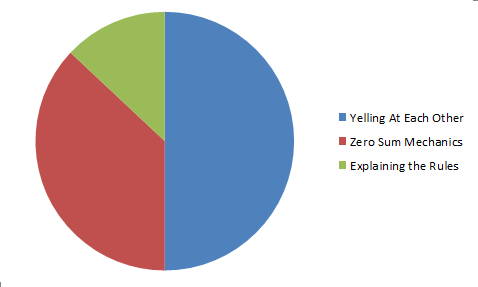Interpreting The Zero Sum
Lately, when I have been talking about games, I have run across a term. It is not Euro or Amerithrash. It is not Worker placement or Deck-builder. The term I am referring to is much more of a game theory term. The term is Zero Sum. Traditionally the term is used to describe an economic situation in which each participant’s gain (or loss) of utility is exactly balanced by the losses (or gains) of the utility of the other participant(s) (1). People often use this word to describe the games we play. However over the last few weeks I have heard many people use this term to describe various different games and giving the term various different definitions. Today I would like to take a look at how people are defining this term and discuss its usage in board gaming.

The follow up zero sum game to an other zero sum game is plotting the demise of the winner of the first.
The first definition I have encountered is one where zero sum is use to describe a game where there is only one winner and one loser. If you read my article on Gamefest last week we could use this verso to talk about the way Mike Fitzgerald talked about true games. This definition works well to describe a game that is only between two players like Fields of Arle or, in the case of the conversation I had, Warhammer 40k Conquest. The person I was talking to mentioned that zero sum games are a great way to test ones skill against an opponent and while I agree two player games are traditional the best way to test your skill, I do not think that is a proper usage of the term zero sum.

Zero sum game my ass Johnny, curse your sudden but inevitable betrayal!
An alternate definition I was offered was when talking about Ophidian 2350 with a friend from Envoy, the company I run demos for. In this case he used the term to talk directly about the victory mechanic. In Ophidian 2350 the main way to win is by gaining victory points from your opponent. You gain these victory points by killing their gladiators, which are used to fight each other. If a player loses a gladiator it also makes it harder from them to kill their opponent’s gladiators due to having less bodies in play. This was seen as zero sum due to the fact that when one player wins something the opponent loses something. This is more in line with the true economic definition with a twist of game theory thrown in. In this case there is not net wealth gain because the player who gained the victory point did not get another body to use, just more game winning currency.
Personally I can see the reason for both usages but I think it is hard to call an entire game zero sum. In my opinion, mechanics tend to be more easy to categorize as zero sum due to the nature of component limitations or fixed victory conditions. Warhammer 40k Conquest has only a set amount of planets you can win. When a player wins a planet, the other player cannot ever score it. That interaction represents more of a zero sum interaction. However, the components are not limited to the physical pieces so that aspect is not technically a zero sum interaction. If I gain a resource my opponent is not now limited in how many they can gain throughout the entire game. So is Warhammer 40k Conquest zero sum because it has a winner and loser or because it has a fixed amount of planets that a player can win or is it not a zero sum game because the game on the whole is not in a closed resource system?
It is an interesting question and I feel like it can be hotly debated. The term zero sum to me can really only be used to describe mechanics of a game and not the game as a whole but I am sure many people will disagree with me and you should! If you do disagree or feel like I left something out let us know in the comments. Thanks for reading and I’ll see you next time.
-Kyle
References:
(1): Bowles, Samuel (2004). Microeconomics: Behavior, Institutions, and Evolution. Princeton University Press. pp. 33–36. ISBN 0-691-09163-3.

